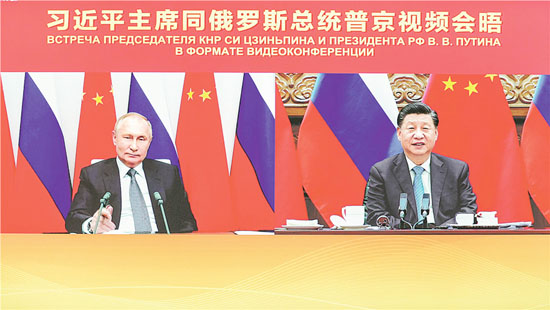Presidents Xi Jinping and Vladimir Putin conducted their 37th bilateral virtual summit on December 15, exhibiting an unprecedented level of political cooperation and mutual trust. In the lead-up to the event, the Russian president’s spokesperson defined the talks as taking placing between the “allies,” which was proved by the states’ leaders, who branded the partnership “a model of coordination between countries in the 21st century.” As a sign of personal “best friends” relationship in the beginning, both statesmen exchanged convivial greetings and waved at each other with their hands. Chinese President Xi Jinping hailed Vladimir Putin’s firm support of China’s core interests and his determination to repel any attempts to sow discord between Russia and China.
The reinforcement of the growing China-Russia entente is happening against the backdrop of plunging relations with the West – namely the U.S., NATO and the EU. Russia has been severely criticized for its “military manoeuvres” near the border with Ukraine and was also warned of “unprecedented sanctions if it decided to make any provocations against Kiev’s sovereignty.” In the recent videoconference with U.S. President Joe Biden, Putin outlined unambiguously Russian security guardrails and made it specifically clear that Moscow would not hesitate to respond accordingly should red lines be crossed.
President Xi reassured his Russian counterpart of China’s recognition of Moscow’s concerns about ongoing confrontation with the West as well as Beijing’s backing of Russian demands for specific security guarantees from the U.S. and its allies. As a sign of intensively expanding political trust, President Putin accentuated that the Beijing Winter Olympics is going to be orchestrated at the highest level, and stressed that he was looking forward to the personal rendezvous with his “good friend” – President Xi.
As China faces mounting pressure over the upcoming Olympic Games, Moscow has clarified its stance of strong opposition to the politicization of international sports, stressing that “sports must remain standing beyond the politics.”
Strategically the talks spanned all facets of China-Russia cooperation and summarized incredible results achieved in the passing year. Russian President hailed China as a global centre for the production of Russian COVID-19 vaccines, with agreements already inked with six Chinese manufacturers to produce in total more than 150 million doses of vaccines. Bilateral economic cooperation has also occupied a significant chunk of the talks, with expectations that 2021 will become a historic record for trade turnover surpassing earlier estimates. In the first three quarters of 2021, bilateral trade exceeded $100 billion for the first time ever, and both leaders reiterated their earlier agreement to see China-Russia trade hitting the $200 billion milestone within three years. Both leaders remain adherent to promoting bilateral trade in the national currencies, which witnessed a positive dynamic recently. Chinese reports citing statistics from Renmin University of China indicated that in the first half of 2020, the two countries’ trade in U.S. dollars contracted from 90 percent in 2015 to 46 percent, while deals in the Chinese currency, the yuan, and its Russian counterpart, the ruble, jumped to 24 percent.
Now this trend is set to accelerate as Presidents Xi and Putin support the formation of independent infrastructure for servicing trading operations in order to prevent bilateral economic ties from outside shocks and pressure.
At the international level, both states are also set to deepen their collaboration and present coordinated actions globally. They vowed to promote the idea of holding a UN Security Council summit no later than 2022 and have criticized U.S. attempts to coalescence allies in the Asia-Pacific so as to construct rival blocks. Beijing and Moscow are also increasingly concerned with destabilizing activities of the Quadrilateral Security Dialogue (QUAD), and jointly oppose to the establishment of the AUKUS alliance between the U.S., Australia and Britain – which they say violates international nuclear non-proliferation norms. Besides embracing closer contacts within multilateral structures such as the UN, Russia has promised to comprehensively assist China in its chairmanship of the BRICS in 2022, expediting more aligned approaches within regional blocks. The summit has become a logical finale of this year’s intensive political, economic and military engagements of both states and blazed a trail for the opening of next year’s great power politics season with upcoming offline meeting between Presidents Xi and Putin – the first for the Chinese leader since the start of COVID-19 pandemic. Having just looked back at objectives achieved, the two leaders are now heading forward to more ambitious aims lying ahead. – CGTN
- Latest
- Trending




